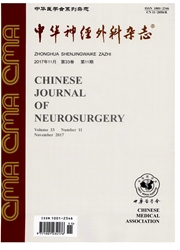

 中文摘要:
中文摘要:
目的观察氢生理盐水对脑外伤后大鼠认知功能的改善作用,并初步探讨其可能机制。方法应用液压打击损伤装置建立大鼠中度颅脑损伤模型,实验动物随机分为对照组、损伤+生理盐水组、损伤+含氢生理盐水组,采用Morris水迷宫法测定大鼠的认知功能表现;利用分光光度比色法、酶联免疫吸附法和Western blot等方法,分别检测受损同侧海马组织中丙二醛(MDA)、脑源性神经生长因子(BDNF)和突触蛋白Ⅰ的水平,并采用方差分析方法进行统计学分析。结果Morris水迷宫法显示腹腔注射含氢的生理盐水能够明显地提高大鼠的认知功能;在对受伤同侧大鼠的海马组织进行测定中,显示损伤后大鼠海马组织中MDA水平的升高及BDNF和突触蛋白Ⅰ水平的下降,而腹腔内注射含氢生理盐水能够明显改善受伤大鼠的认知功能,并能够降低MDA水平,提高BDNF和突触蛋白Ⅰ。结论腹腔内注射含氢生理盐水能够通过抑制氧化损伤,改善颅脑损伤后动物的认知功能,而BDNF及其效应蛋白突触蛋白Ⅰ可能与其认知功能改善有关。
 英文摘要:
英文摘要:
Objective To investigate the effects of hydrogen-rich saline on cognitive function and its mechanisms. Methods Models of fluid percussion injury (FPI) were established. Rats were randomized into normal control group, FPI + saline group and FPI + hydrogen - rich saline group. The cognitive function was evaluated by Morris test; also spectrophotometric assay, ELISA and western blot were used respectively to measure MDA (malondialdehyde), BDNF (brain derived neurophic factor ) and synapsin I in hippocampus. Results After FPI, rats treated with hydrogen - rich saline showed significant improvement in cognition compared with no hydrogen - rich treated rats ( P 〈 0. 05 ) ; also MDA in hippocampus increased and BDNF and synapsin I decreased in the FPI + saline group ( P 〈 0.05 ) ; Compared with FPI + saline group, MDA of hydrogen - rich saline group was lower, while BDNF and synapsin I were higher ( P〈0.05 ). Conclusions With injected intraperitoneally, hydrogen- rich saline showed the protective effects on cognitive function, with the BDNF and synapsin I be involved.
 同期刊论文项目
同期刊论文项目
 同项目期刊论文
同项目期刊论文
 Hydrogen-rich water protects against ischemic brain injury in rats by regulating calcium buffering p
Hydrogen-rich water protects against ischemic brain injury in rats by regulating calcium buffering p Quantitative computer tomography analysis of post-operative subdural fluid volume predicts recurrenc
Quantitative computer tomography analysis of post-operative subdural fluid volume predicts recurrenc 期刊信息
期刊信息
